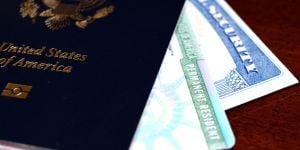
Visa applications can be time-consuming, costly and stressful. To prevent complications and additional stress, ensure you are not stumbling into common pitfalls that could lead to your visa being rejected. Reapplying is a hassle, will delay your plans, and even give you a bad immigration track record, so it's crucial to get it right the first time. Here are some tips.
Missing any required documents or failing to ensure they meet all specifications
Visa applications tend to require a lot of paperwork. Some countries with strict immigration rules have more paperwork than others. Plodding through long lists of instructions and multiple forms is a test of our patience, but we have to bear with it and read everything carefully. Otherwise, we might misread certain parts or even completely omit reading them. This will prevent us from submitting all of the required documents – or submitting them in the wrong format.
Passport photo requirement
Let's look at passport photos, for one. Each country has different size requirements for the photo that will be attached to your visa. The UK's Home Office requires two identical photos, both of which must be 45 millimeters high and 35 millimeters wide in their original size. You risk visa rejection if you submit two photos taken at different times – even if they look slightly similar or if you're wearing the same outfit in them! You also risk rejection if they are larger photos that have been cut down. Meanwhile, the photos required for a Chinese visa are taller but less wide than those for a UK visa: they are 48mm by 33 mm.
Never assume that a foreign country has the same documentation requirements as your home or current country, even for something as simple as photos! Always check the relevant government's website. If that website's English translation is poor, ask for help from a friend who can read the website in its original language. If the language barrier or different administrative/immigration systems are simply too confusing, consult a travel, immigration, or study abroad agent. Spending some money on an agent will buy you peace of mind.
Proof of funds
Visa applications usually also require a bank statement to prove you have enough funds to travel, study abroad, or relocate. A common mistake is not submitting an attested bank statement, i.e., one that has been verified by the issuing bank with a stamp or official signature. Many people mistakenly believe they can simply submit an e-statement downloaded from their online banking account.
Another mistake is not getting that statement translated by a certified or sworn translator if the language it is written in is different from the official language(s) of the immigration department you need to send it to. If finding a translator locally is difficult, especially for rarer language combinations, you can contact an online translation agency to handle this. For instance, expats applying for a permanent visa in Australia, you can contact the Free Translation Services (FTS) of the Department of Home Affairs. It should be noted that for translations not done by the FTS, Australia requires the translator to be accredited by a body like the ATA (American Translators Association). If you are unsure if your translator meets their requirements, contact the embassy or consulate to ask. They usually have a directory of approved translators in each region.
Other documents in the application must also be translated the same way. This includes birth certificates, driver's licenses, business documents and police records. Make sure to submit both the original and translation – submitting only the translation might also get your application rejected!
Make sure to check all of the requirements for this translation. For instance, documents in the UK must include the date of the translation, the translator's full name, signature and contact details, and their written confirmation about the translation's accuracy. If your translator forgets to include their contact details and you neglect checking if they did, your visa application risks being rejected!
Making careless mistakes and omitting information on the forms
When filling in page after page of boring paperwork, we can easily misspell words, forget to tick a box, get our own passport number wrong, or forget to include one destination in our travel history. All of the information on the forms must be perfectly consistent with our official documents, especially our passport.
Proofreading is vital. Once the forms are filled out, set them aside for a few hours or even days before reviewing them with fresh eyes to ensure that all the information is accurate. Do not leave any fields blank. If you are unsure of what should be written in a field, ask a friend who has obtained this visa before, a travel agent, a lawyer or the embassy. Some visa processes require extensive information.
Controversially, since 2019, US visas require applicants to submit their social media details. The State Department claims that this helps screen for terrorism, although experts question its effectiveness and privacy implications. This rule is currently under review but remains in effect. So, be prepared to list all of your social media handles, even those you rarely use. For example, if you have an inactive X account handle that remains publicly attached to your name, include it in your visa application. Otherwise, immigration officials could interpret its omission as an attempt to hide information and grill you about it during the visa interview.
Having suspicious travel and financial history
Immigration authorities need to review your travel history to ensure you are a legitimate visitor, have complied with immigration law in other countries, and are not under suspicion for illegal activities such as smuggling or terrorism.
It is a green flag if your passport shows that you have previously obtained visas from other countries with a rigorous immigration system. If you still have a valid US visa, for instance, it signals to other countries that you were able to pass the rigorous requirements of the US Department of State. Actually, having a valid US visa in your passport allows you to enter most Latin American countries without needing an additional visa!
It's wise not to throw away your expired passports. You might need to consult them for your travel history. Many visa applications will ask for detailed information about the trips you've taken in the last 5-10 years, including the date of entry and exit. If you don't have your old passports or copies of your plane tickets, you can still safely give approximate dates. The important thing is that your overall travel history does not look suspicious. Entering and exiting the same destination every few months may be a red flag. So is visiting countries deemed “high-risk” for political reasons. The UK's Home Office provides a list of travel warnings for different countries on its website. It is a good resource to consult to gauge how certain countries might look in your travel history.
What can you do if you don't want to be unfairly penalized for harmlessly visiting a “high-risk” country? If possible, opt for a visitor card rather than a stamp on your passport. Or get the stamp in your second passport if you are a citizen of two countries. Cuban authorities, for one, are willing to replace a passport stamp with a separate card to protect visitors from being denied a US visa later on because of the American blockade on the island-state. Otherwise, be prepared to provide a detailed explanation of why you visited a country deemed “high-risk.” Keep records of all aspects of your trip there, including bookings for hotels and leisure activities.
The attested bank statement you submit with your application should also show a positive financial history. You must have proof of funds to cover the length of your stay as a tourist, your first year as a student, or your first few months as a worker. It would be a red flag if most of the money was transferred into your account less than a month ago. Your visa also risks being rejected if you submit a statement that was issued too long ago (e.g., from over 3 months ago in the US). If your job description does not match the money flow into your account, you might be questioned about their source during your visa interview. Do not make the mistake of providing a bank account that is not in your name unless you have also submitted the details of a sponsor.



















